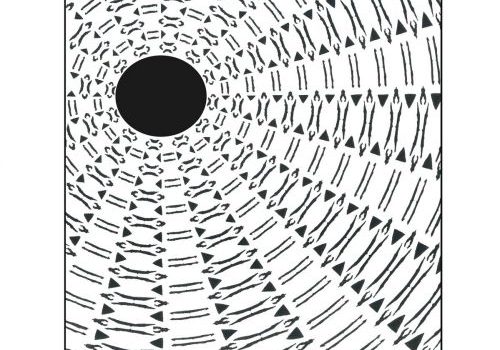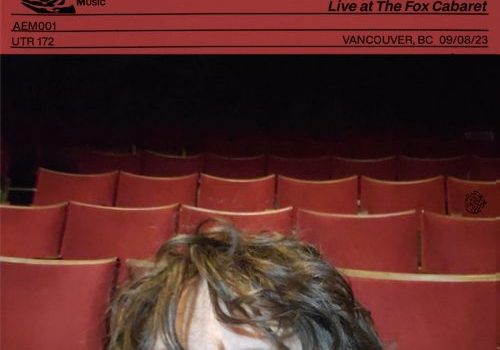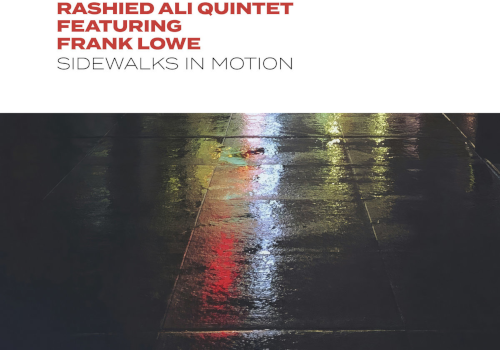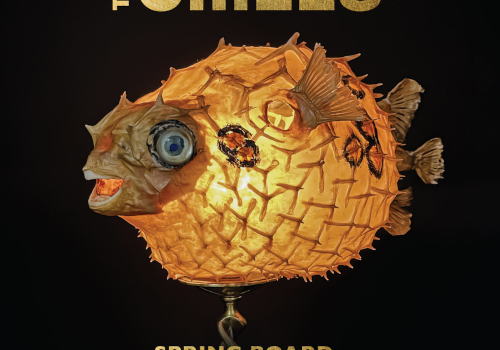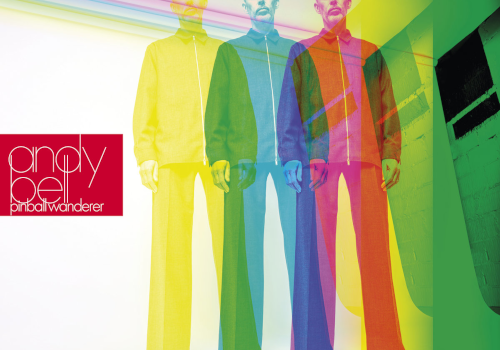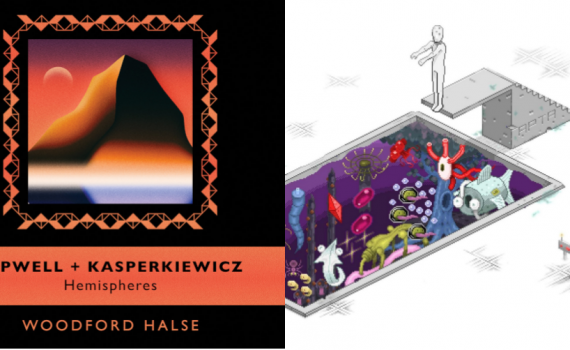They like their guitars heavy and their riffs to circle as cymbals crash, but there is a dreaminess to their distance and there is a feeling, particularly on opening track "One Thousand Years", that they are making their way slowly up a mountain, the guitar gradually winding tighter, preparing us for an incredible view.
Album review
Having totally missed their recent Bristol outing, I’m glad Upset The Rhythm are now offering a tantalising taste of Earth Ball in action. A duo of live cuts, each gig filling a whole side each.
...there are ten players including Martin to bring this eclectic selection to life and sees the assembled throng veering through jazz, prog, psych and funk with what can only be described as aplomb. In fact, there is little opportunity for respite over this fifty-five-minute blast and each song seems to consist of numerous parts; some segues sympathetic while others are unexpected.
DO 555 PS is his first solo outing, utilising ideas formulated with his Pelican System album, but pushing them further and attempting to create a suite of songs for an imagined world from saxes, samples and electronics, and what an impressive feat it is. Over ten tracks, real and imagined sounds roil and reverberate, generating an atmosphere that picks at the edges of reality, uncovering a universe hidden in the shadows; one for which we need to take a deep breath before entering.
Upset The Rhythm It has been seven years since the last Rattle album and it feels as though in the down time Theresa Wrigley and Katharine Eira Brown have chosen to strip their drum and vocal sound down to the absolute bare bones, as if Sequence was too busy. They have stuck with the formula of two tracks per LP side but, with one being substantially longer then […]
Although Swiss melodic post-indie rock trio Ventura has been a unit for the best part of twenty years, this is only their fifth album but what a great discovery for these ears. Using the power of the guitar/bass/drums line-up, they cue up ten strong yet diverse tracks on Superheld that run from the slow strength of "Bubbles" to the rhythmically awkward "Advertiser", passing through all manner of other stylings to keep the listener constantly engaged.
His playing on Sidewalks In Motion bears a fair amount of resemblance -- a drummer that's worth listening to. Lots of big dynamics in paradiddles, ever-present and holding things down, but rarely bandstanding. A lot of skittering goes on, but never into the realm of free improv.
The end result is Convergence & Variations, a lovely melding of the recognised and the unexpected; a meeting of two like minds who gently push one another in directions that they may not have chosen to head separately, using pieces by the likes of Bach, Schubert and Satie as jumping-off points for their collective imagination.
Mdou Moctar has, in the last decade or so, ripped through the consciousness of whatever we're calling underground music these days. First with the Music From Saharan Cellphones (very autotune, very drum machines) and later with his full band business occupying the rarely seen 'actually good' slot of contemporary psychedelic music. Difficult to say whether Moctar is psych -- I'd say not -- because I gather he's closer to Tuareg traditions than not, but perhaps psych is a broader church than I think of it as.
Some tracks sound like conversations between beings struggling to communicate but drawn together by some greater force. Different textures manifest themselves; his breathing direct through the reed is interrupted by electronic interjections, while the swiftness of a romantic moment is is pummelled by percussive points and the distant movement of comets.
With his 2023 debut, Evensongs, having rightly been hailed for its modern but ageless psych-folk magnetism -- by Mark Radcliffe, Shindig! and the Guardian alike -- expectations are set quite high for this sequel set. Whilst the nine-song Collodion possibly doesn’t quite possess the same out-of-the-blue awe of its old-as-new prequel, this is still a sublime twenty-minute offering in its own right.
Although the Kjetil Mulelid Trio has been recording since 2017, this is their first album with replacement bassist Rune Nergard and continues their jazz-adjacent explorations with a light and adventurous sound that ushers the listener through landscapes familiar yet refreshed.
The blustery synth sounds drag the song kicking and screaming into a riotous finale that plays havoc with their melodic heavy indie-rock sound. The wild synth action that takes place in the background of "Pretty Sticks" adds fresh texture to an already teeming sound that has the head nodding, gesturing towards the dancefloor as the quiet breakdown and slow build ramps up enthusiasm.
Whilst sadness surrounds the unveiling of this posthumous affair from The Chills – following the premature passing of the New Zealand group’s only constant member Martin Phillipps last year – we can take comfort in the fact that the late-reblooming legacy continues to be given considerate curation on Fire Records. A fully fledged and seemingly intentional swansong project, conceived by Phillips himself, Spring Board brings the band’s somewhat unwieldy story full circle to a well-groomed, if pathos-tinged, celebratory conclusion.
For his latest long-player on Sonic Cathedral -- the punningly anointed Pinball Wanderer - Bell seems increasingly comfortable in his own sonic skin, to the point of allowing the boundaries between his two sole trader ventures to be openly blurred.
Those former Yugoslav industrials certainly hit vital back then -- trumpet fanfares, pounding drum falls, those rousing anthem repeats; even today it’s still sonically captivating, so much so I didn’t think it needed a rework, but Laibach definitely saw potential in them old bones.
As cornerstone enterprises in what Electronic Sound magazine recently redubbed as the ‘grassroots electronica’ scene, Doncaster’s Woodford Halse and Biggleswade’s Castles In Space labels continue to curate physical and digital releases with care and affection, as well as supporting their signings to stretch beyond straightforward musical appliance reverence. As these first two new outings of 2025 from each imprint exemplify.
After his album Spektralmaskin with Peder Simonsen, where he used self-designed e-bows to produce random harmonics on guitars, he has turned his attention to the piano and has produced his own take on the player piano. Adding electronic magnets attached to steel bars, one for each key, the instrument produces vibrations as the magnets affect the strings and it is from these these extraordinary tones that For Renstemt Klaver is rendered.
